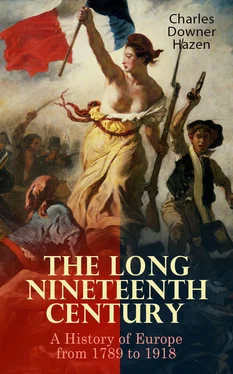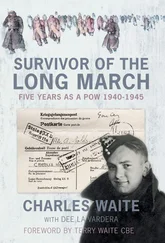Charlotte Corday, a Norman girl, who had stabbed the notorious Marat to death, thinking thus to free her country, paid the penalty with serenity and dignity. All through these months men witnessed a tragic procession up the scaffold's steps of those who were great by position or character or service or reputation; of Bailly, celebrated as an astronomer and as the Mayor of Paris in the early Revolution; the Duke of Orleans, who had played a shameless part in the Revolution, having been demagogue enough to discard his name and call himself Philip Equality, and having infamously voted, as a member of the Convention, for the death of his cousin, Louis XVI; Barnave, next to Mirabeau one of the most brilliant leaders of the Constituent Assembly; and so it went, daily executions in Paris and still others in the provinces. Some fleeing the terror that walked by day and night, caught at bay, committed suicide, like Cordorcet, last of the philosophers, and gifted theorist of the Republic. Still others wandered through the countryside haggard, gaunt, and were finally shot down, as beasts of the field. Yet all this did not constitute 'the Great Terror,' as it was called. That came later.
Thus far there was at least a semblance or pretense of punishing the enemies of the Republic, the enemies of France. But now these odious methods were to be used as means of destroying political and personal enemies. Politics assumed the character and risks of war.
We have seen that since August 10, 1792, there were two powers in the state, the Commune or Government of Paris and the Convention or Government of France, now directed by the Committee of Public Safety. These two had in the main cooperated thus versus far, overthrowing the monarchy, overthrowing the Girondists. But now dissension raised its head and harmony was no more. The Commune was in the control of the most violent party that the Revolution had developed. Its leaders were Hebert and Chaumette. Hebert conducted a journal, the Pere Duchesne, which was both obscene and profane and which was widely read in Paris by the lowest classes. Hebert and Chaumette reigned in the City Hall, drew their strength from the rabble of the streets which they knew how to incite and hurl at their enemies. They were ultra-radicals, audacious, truculent. They constantly demanded new and redoubled applications of terror. For a while they dominated the Convention. Carrier, one of the Convention's representatives on mission, was really a tool of the Commune.
It was the Commune which now forced the Convention to attempt the dechristianization of France. For this purpose a new calendar was desired, a calendar that should discard Sundays, saints' days, religious festivals, and set up novel and entirely secular divisions of time. Henceforth the month was to be divided not into weeks, but into decades or periods of ten days. Every tenth day was to be the rest day. The days of the months were changed to indicate natural phenomena, July becoming Thermidor, or period of heat; April becoming Germinal, or budding time; November becoming Brumaire, or period of fogs. Henceforth men were to date, not from the birth of Christ, but from the birth of Liberty. The Year One of Liberty began September 21, 1792. The world was young again. The day was divided into ten hours, not twenty-four, and the ten were subdivided and subdivided into smaller units. This calendar was made obligatory. But great was the havoc created by the new chronology. Parents were required to instruct their children in the new method of reckoning time. But the parents had been brought up on the old system and experienced much difficulty in telling what time of day it was according to the new terminology. Watchmakers were driven to add another circle to the faces of their watches. One circle carried the familiar set of figures, the other carried the new. Thus was one difficulty partially conjured away. The new calendar lasted twelve years. It was frankly and intentionally anti-Christian. The Christian era was repudiated.
More important was the attempt to improvise a new religion. Reason was henceforth to be worshipped, no longer the Christian God. A beginning was made in the campaign for dechristianization by removing the bells from the churches, "the Eternal's gewgaws," they were called, and by making cannon and coin out of them. Death was declared to be "but an eternal sleep" thus Heaven, and Hell as well, was abolished. There was a demand that church spires be torn down "as by their domination over other buildings, they seem to violate the principle of equality," and many were consequently sacrificed. This sorry business reached its climax in the formal establishment by the Commune of Paris of the Worship of Reason. On November 10, 1793, the Cathedral of Notre Dame was converted into a "Temple of Reason." The ceremony of that day has been famous for a century and its fame may last another. A dancer from the opera, wearing the three colors of the republic, sat, as the Goddess of Reason, upon the Altar of Liberty, where formerly the Holy Virgin had been enthroned, and received the homage of her devotees. After this many other churches in Paris, and even in the provinces, were changed into Temples of Reason. The sacred vessels used in Catholic services were burned or melted down. In some cases the stone saints that ornamented, or at least diversified, the facades of churches, were thrown down and broken or burned. At Notre Dame in Paris they were boarded over, and thus preserved for a period when their contamination would not be feared or felt. Every tenth day services were held. They might take the form of philosophical or political discourses, or the form of popular banquets or balls.
The proclamation of this Worship of Reason was the high-water mark in the fortunes of the Commune. The Convention had been compelled to yield, the Committee of Public Safety to acquiesce in conduct of which it did not approve. Robespierre was irritated, partly because he had a religion of his own which he preferred and which he wished in time to bring forward and impose upon France, partly because as a member of the great Committee he resented the existence of a rival so powerful as the Commune. The Hebertists had shot their bolt. Robespierre now shot his. In a carefully prepared speech he declared that "Atheism is aristocratic. The idea of a Supreme Being who watches over oppressed innocence and who punishes triumphant crime, is thoroughly democratic." He furtively urged on all attacks upon the blasphemous Commune, as when Danton declared, "These anti-religious masquerades in the Convention must cease."
But Robespierre was the secret enemy of Danton as well, though for a very different reason. The Commune stood for the Terror in all its forms and demanded that it be maintained in all its vigor. On the other hand Danton, Camille Desmoulins, and their friends, ardent supporters of the Terror as long as it was necessary, believed that now the need for it had passed and wished its rigor mitigated and the system gradually abandoned. The armies of the Republic were everywhere successful, the invaders had been driven back, and domestic insurrections had been stamped out. Sick at heart of bloodshed now that it was no longer required, the Dantonists began to recommend clemency to the Convention.
The Committee of Public Safety was opposed to both these factions, the Hebertists and the Dantonists, and Robespierre was at the center of an intrigue to ruin both. The description of the machinations and manoeuvres which went on in the Convention cannot be undertaken here. To make them clear would require much space. It must suffice to say that first the Committee directed all its powers against the Commune and dared on March 13, 1794, to order the arrest of Hebert and his friends. Eleven days later they were guillotined. The rivalry of the Commune was over. The Convention was supreme. But the Committee had no desire to bring the Terror to an end. Several of its members saw their own doom in any lessening of its severity. Looking out for their own heads, they therefore resolved to kill Danton, as the representative of the dangerous policy of moderation. This man who had personified as no one else had done the national temper in its crusade against the allied monarchs, who had been the very central pillar of the state in a terrible crisis, who, when France was for a moment discouraged, had nerved her to new effort by the electrifying cry, "We must dare and dare again and dare without end," now fell a victim to the wretched and frenzied internecine struggles of the politicians because, now that the danger was over, he advocated, with his vastly Danton heightened prestige, a return to moderation and conciliation.
Читать дальше












